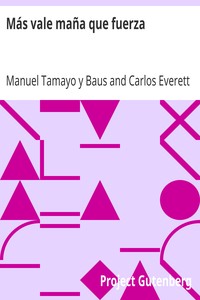Más vale maña que fuerza: Proverbio en un acto; with notes, exercises, and vocabulary
Author: Manuel Tamayo y Baus
Bookshelves: Literature, Category: Plays/Films/Dramas

Summary
"Más vale maña que fuerza" by Manuel Tamayo y Baus is a theatrical play written in the late 19th century, reflecting the style and themes prevalent in Spanish drama of that period. As indicated by its title, which translates to "Better Craftiness than Strength," the play embodies moral lessons delivered through the interactions of its characters. The central figures include Elisa, Antonio, and Juana, who navigate themes of love, jealousy, and the complexities of married life. The opening of the play introduces the character Elisa, who is anxiously waiting for her husband, Antonio, to return home. She is troubled by the fact that he seems distant, especially on the occasion of their second wedding anniversary. Juana, her friend, soon arrives, bringing with her a mix of humor and drama, and reveals her own concerns about her husband, Miguel. Their conversation revolves around the challenges they face in their marriages, highlighting themes of trust, fidelity, and the dynamics of power within relationships. Juana's sarcastic remarks about her husband's character provide comic relief, while Elisa's patience and affection for Antonio exemplify a more traditional view of marriage. The beginning establishes a tension that promises to unravel throughout the play. (This is an automatically generated summary.)
 LibraryManager
LibraryManager